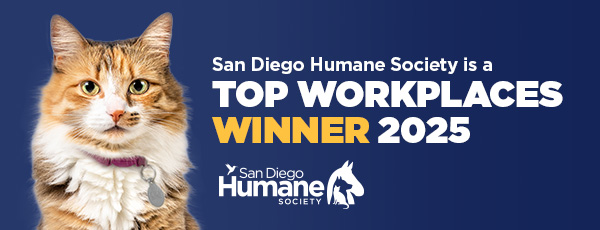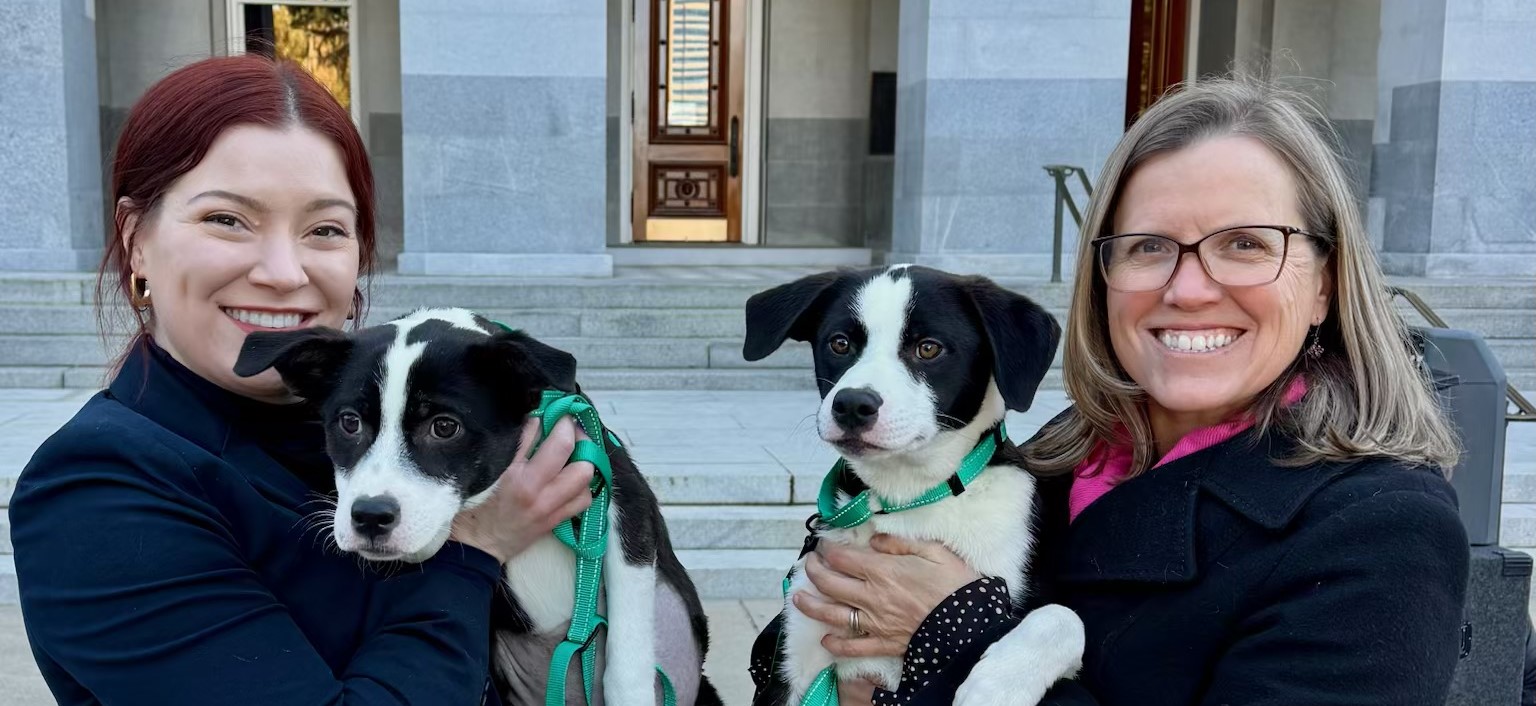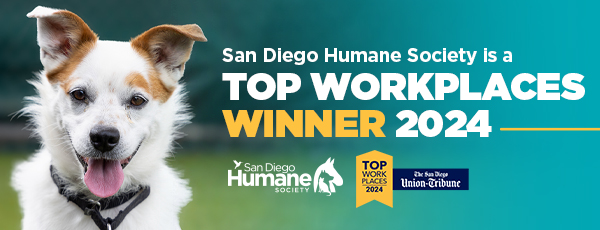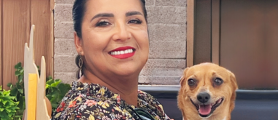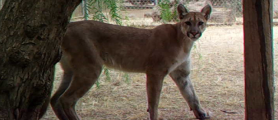Investigation Into Death of Horse at Petco Park Rodeo
San Diego Humane Society’s Humane Law Enforcement team has concluded their investigation into the tragic death of a pregnant horse at the rodeo held at Petco Park Jan. 11, 2025.
On the evening of Jan. 11, the horse participated in the saddle bronc competition. There were no visible signs of injury during the event, but approximately 15 minutes after competing, the horse began shaking. A call for veterinary assistance was placed immediately and our Humane Officers, along with on-site veterinarians, responded within minutes. Tragically, the horse collapsed and died before any treatment could be provided.
Our team launched an investigation immediately into the cause of this tragic loss and whether criminal negligence played a role. A necropsy of the horse determined that she was in her third trimester of pregnancy, and that the cause of death was a ruptured uterine artery.
As part of the investigation, our Humane Officers worked with two forensic veterinarians, as well as the lab veterinarians who performed the necropsy. Our officers also traveled out to the ranch the horse came from to investigate if there were any legal concerns with husbandry or care of the horses at that location. After thorough investigation, there is no probable cause to bring charges against the rodeo or horse owner. It is unclear whether participating in the saddle bronc competition directly caused the horse’s death.
While San Diego Humane Society and many animal lovers stand in opposition to this practice, it is common for pregnant horses to participate in saddle bronc competitions. Most importantly, it is legal. No laws were broken when this pregnant horse and her foal died at Petco Park — nor were any laws broken when a horse was injured at last year’s rodeo. However, just because something is legal does not make it humane.
This incident — along with the injury of a horse during last year’s rodeo in San Diego, as well — reinforces our opposition to rodeos and the inherent risks they pose to animals. The fact remains: two rodeos have been held in our city, and both resulted in animal injury and death.
At San Diego Humane Society, we believe our community must set a higher standard of compassion for animals. While the law does not currently prohibit rodeos, this is a policy issue that demands attention. No laws were broken, but a horse is dead. That is why we’re advocating for policy change in San Diego. We encourage city leaders to take action to ensure no rodeos are held within the City of San Diego in the future.
We will continue advocating for stronger protections for animals in our community because no animal should have to suffer for the sake of entertainment.
FAQs
How did San Diego Humane Society investigate this incident?
Our team launched an investigation immediately into the cause of this tragic loss and whether criminal negligence played a role. A necropsy of the horse determined that she was in her third trimester of pregnancy, and that the cause of death was a ruptured uterine artery.
As part of the investigation, our Humane Officers worked with two forensic veterinarians, as well as the lab veterinarians who performed the necropsy. Our officers also traveled out to the ranch the horse came from to investigate if there were any legal concerns with husbandry or care of the horses at that location. After thorough investigation, there is no probable cause to bring charges against the rodeo or horse owner. It is unclear whether participating in the saddle bronc competition directly caused the horse’s death.
Did the foal survive?
Tragically, the foal did not survive. In addition to the rupture of the uterine artery, which was the direct cause of the horse’s death, the uterus itself ruptured. Medical examiners could not confirm whether the uterus rupture contributed to the cause of death or took place postmortem.
Why are we not able to directly link the horse’s participation in the saddle bronc competition to her cause of death?
During the necropsy, which was performed on Monday, Jan. 13, it was determined that the uterus was friable, meaning that it was more susceptible to damage. As mares have foals, the arteries around the uterus become more delicate and rupture more easily. It’s a possibility that the horse could have experienced a rupture prior to participating in the rodeo. It’s certainly possible that participating in the rodeo caused the rupture, but we cannot say for certain, and the injury could have happened regardless.
Why can’t San Diego Humane Society pursue criminal charges?
Animal cruelty in California does not need to be intentional or malicious to bring criminal charges. Under Penal Code §597, animal cruelty can be charged if someone intentionally, knowingly, or through criminal negligence causes harm to an animal. In the context of animal cruelty under California law, criminal negligence refers to behavior that is reckless, grossly careless, or demonstrates a disregard for the wellbeing of an animal. It goes beyond ordinary negligence (simple carelessness) and involves a failure to act with reasonable care in a way that any reasonable person would recognize as likely to cause harm. In contrast, accidental harm generally does not rise to the level of criminal negligence.
After conducting multiple interviews, collecting witness statements and expert opinions, it has been determined that no laws were violated and there is no probable cause for criminal charges against horse owner, or the San Diego rodeo organizers. We cannot prove definitively whether the horse’s participation in the rodeo directly contributed to her death or that anyone had knowledge that she was more pregnant than the assumed eight months based on the horse owner's breeding schedule. The horse appeared very well maintained and provided for and her death appears to have been accidental and unforeseen.
Why is it common for pregnant horses to compete in saddle bronc competitions?
It is standard practice in the rodeo industry for bucking horses to be pregnant, because they are more focused. When horses are in heat, they don’t focus and are less able to compete. Sadly, pregnancy is considered performance enhancing. However, it is not common for horses to be in the third trimester of pregnancy when competing. In this case, the owner states that he was unaware of how far the horse’s pregnancy had progressed and staff on-site did not observe obvious signs of late stage pregnancy. The forensic veterinarian reviewing the footage was also unable to immediately determine that the horse was in her third trimester, and it was only determined postmortem.
How can community members take action to oppose the rodeo?
Please visit sdhumane.org/rodeo to sign our petition. We also encourage community members to contact the councilmember in their district, as well as the San Diego Padres, to advocate for an end to rodeos in San Diego County.
Why is San Diego Humane Society opposed to the rodeo, but not to horse racing?
San Diego Humane Society is indeed opposed to horse racing. However, horse racing is regulated at the state level, making it harder for us to have an immediate, direct impact through our communications and advocacy. For this reason, we are focusing our resources so they can make the biggest impact on animal welfare in our community.
Questions about the incident or our actions regarding the rodeo can be sent to [email protected].
Published: February 11, 2025


